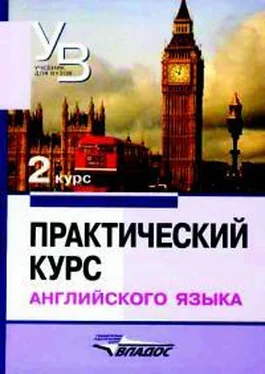together,"
"Done," he said.
We shook hands. I wished him good luck and he left me. I had a lot of work to do that
morning and I only just managed to get to the creek at Tarumi at half past twelve. But I needn't have
hurried; he never turned up."
"Did he funk it at toe last moment?" I asked.
"No, he didn't funk it. He started all right. But of course he'd ruined his constitution by drink
and dissipation. The currents round the beacon were more than he could manage. We didn't get the
body for about three days."
I didn't say anything for a moment or two, I was a trifle shocked. Then I asked Burton a
question.
"When you made him that offer of a job, did you know he'd be drowned?"
He gave a little mild chuckle and he looked at me with those kind and candid blue eyes of
his. He rubbed his chin with his hand.
"Well, I hadn't got a vacancy in my office at the moment."
VOCABULARY NOTES
1. to curl υt/i. 1. завивать(-ся), закручивать(-ся), e.g. She has curled her hair. The old man
was curling his long moustache.
2. виться, клубиться, е.g. Does her hair curl naturally or does she curl it in curlers? The
smoke from our camp-fires curled upwards among the trees.
to curl one's lipпрезрительно кривить рот, е.g. I don't like the way she curls her lip when
talking to me.
to curl upсвертывать(-ся), е.g. The child curled up in the arm-chair and went to sleep.
curling adj вьющийся (о волосах)
Cf. curled adj завитой and curly adj кудрявый, е.g. I don't like curled hair. But I liked this
plump curly-headed little boy.
curl n 1. локон, завивка; 2. все, что имеет форму завитка, е.g. The girl had long curls over
her shoulders. How do you keep your hair in curl? Soon we saw the curls of smoke rise upwards.
2. to break (broke, broken) υt/i 1. ломать(-ся), разбивать(-ся), е.g. Не fell and broke his
leg. Who broke the window? Glass breaks easily.
to break(smth.) in two (three, etc.) разбить(-ся), разломать(-ся), разорвать(-ся) на две
(три и т.д.) части, е.g. The mother broke the bread in two and gave each child a piece.
to break to piecesразбить(-ся) вдребезги, е.g. The vase fell and broke to pieces.
2. чувствовать себя разбитым (морально, физически), разориться, usu. to be broken,
е.g. Не was completely broken as the result of the failure of his business. She was broken after her
husband's death.
3. нарушать, as to break the law, a promise, one's word, an appointment
Ant. to keep, е.g. She broke the appointment. = She did not keep it
to break with smb. or smth.(old habits, traditions, etc.) порвать с.., покончить с..., е.g. Не
can't break with his bad habits.
to break offпрекратить внезапно ( разговор, беседу), е.g. When she came in he broke off.
He broke off in the middle of a sentence.
N o t e:No object after break off. Cf. in Russian: прекратить разговор.
to break outначинаться внезапно, вспыхнуть ( об эпидемии, пожаре, войне), е.g. A fire
broke out during the night.
to break through (smth.)прорывать(-ся), е.g. The partisans broke through the enemy's
line.
to break the recordпобить рекорд
break n перемена, перерыв ( в работе, учебе и т.д.), е.g. I feel tired, let's have a break.
We're working since nine o'clock without a break.
3. to stick (stuck, stuck) υt/i 1. приклеивать(-ся), наклеивать; липнуть; прикреплять,
as to stick a stamp on a letter, to stick a notice on a board. These stamps won't stick. The nickname
stuck to him.
2. оставаться; держаться, придерживаться? стоять на своем, е.g. Friends should stick
together. You must stick to your promise. Though Tom saw that nobody believed him, he stuck to his
words. Stick to business! (He отвлекайтесь!)
3. втыкать, затыкать; засовывать, е.g. The girl stuck a flower in her hair. He stuck his hands
in his pockets.
4. застрять, завязнуть, е.g. The splinter stuck in my finger. The car stuck in the mud. The
key stuck in the keyhole.
4. to drive (drove, driven) υt/i 1.гнать (скот); преследовать (неприятеля), е.g. Не
drove the horses into the forest.
2. править, управлять (машиной, автомобилем), е.g. He's learning to drive.
3. ехать (в автомобиле, экипаже), е.g. Shall we drive home or walk?
N o t e:With reference to travelling on a bicycle, on a horse or other animal the verb to ride
is used, е.g. He jumped on his horse and rode away. He rode over on his bicycle to see me yesterday.
to drive up (away)подъезжать (отъезжать), e.g. We drove up to the house.
to drive at( colloq.) клонить к чему-л., намекать на что-л., е.g. I could not understand
what he was driving at.
to drive smb. madсводить с ума
drive n катание, езда, прогулка (в автомобиле, экипаже), е.g. We had a nice drive.
to go for a driveпрокатиться, совершить прогулку в автомобиле, е.g. Shall we go for a
drive round the town?
driver n шофер, водитель, машинист, as a bus-driver, tram-driver, taxi-driver, engine-
driver
5. pause n пауза, перерыв; передышка, е.g. There was a short pause while the next
speaker got on to the platform. A pause is made because of doubt or hesitation or for the sake of
expressiveness when speaking, singing, reading, etc.
Syn. break
to make a pauseделать паузу, останавливаться, е.g. The speaker made a short pause to
stress his words.
to pause υi делать паузу, останавливаться, е.g. Не paused to collect his thoughts. He went
on without pausing.
Syn. stop
N о t e: to stopis usually used when the action is not supposed to continue; to pause is used
when there is only a temporary break in the action, especially in speech or writing, е.g. He paused
Читать дальше





![Владимир Аракин - Практический курс английского языка 3 курс [calibre 2.43.0]](/books/402486/vladimir-arakin-prakticheskij-kurs-anglijskogo-yazyk-thumb.webp)






